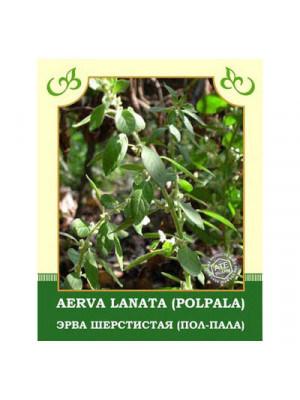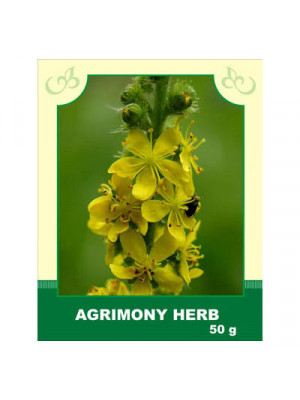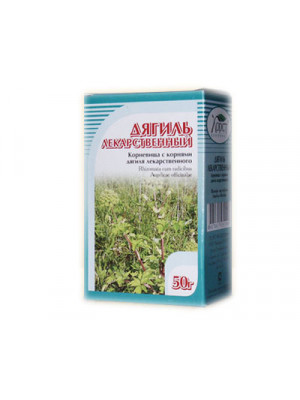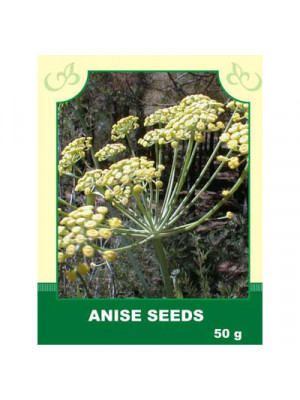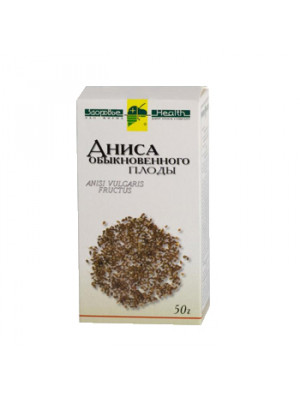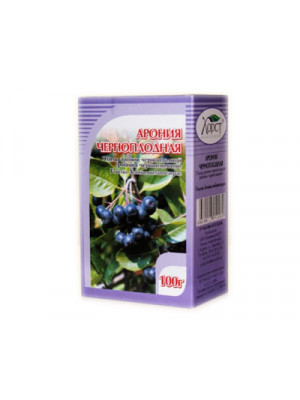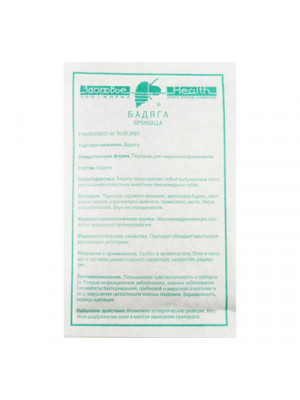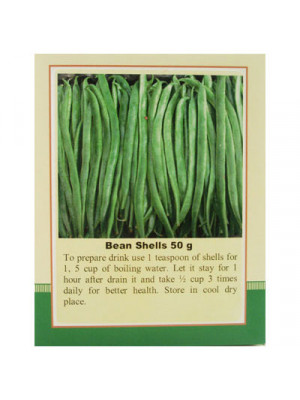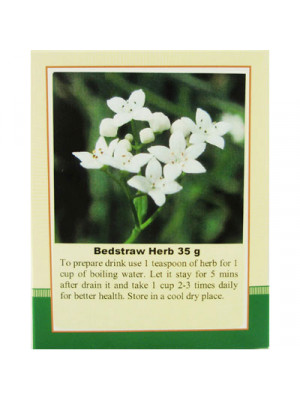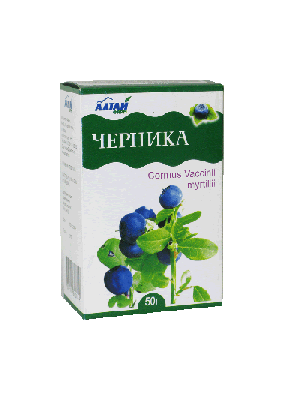Herbs
Folk beliefs attribute unique abilities to common yarrow, such as preventing the formation of blood clots in vessels and reducing blood clotting.
Internally, it is taken as a remedy for bronchitis, tracheitis, common colds, reducing inflammation, clearing the respiratory tract from toxins and mucus, and for diseases of the urogenital system and reproductive organs. It normalizes the functioning of the gastrointestinal tract, liver, and pancreas. There is evidence of high effectiveness in cases of intestinal polyps and hemorrhoids, as well as for relieving constipation.
Method of application and dosage: Place 2 teaspoons of crushed herb in a teapot, pour 250 ml of water, boil for 3-5 minutes, and let it steep for a short while. Consume by adding sugar or honey to taste.
Contraindications: Individual intolerance; during intake, it is advisable to exclude spicy and salty foods, as well as alcohol from the diet.
$6.99Internally, it is taken for gastrointestinal diseases, hemorrhoids, gallbladder issues, bleeding, rheumatism, herpes, inflammation of the laryngeal mucosa, as well as for furunculosis, poorly healing wounds, migraines, nocturnal enuresis, atony of the bladder, and urolithiasis. Infusion with honey is one of the best remedies for liver and spleen diseases.
Method of application and dosage: Steep 2 tablespoons of raw material in 400 ml boiling water, infuse for 2 hours, strain, and take 1/2 cup 4 times a day before meals.
Externally, the infusion is used for rinsing the oral cavity in various inflammatory processes (tonsillitis, laryngitis, pharyngitis), for nasal congestion, and for washing wounds and ulcers, as well as for abrasions and bruises. Steep 5 tablespoons of raw material in 400 ml boiling water, infuse for 15-20 minutes, strain, squeezing the remaining raw material.
Contraindications: Individual intolerance. Use with caution for children and elderly people.
$6.99- Angelica has a tonic effect on the cardiovascular and central nervous system, increases the secretion of bile and pancreatic juice. Angelica is used to treat gout, rheumatism and low back pain, use rubbing alcohol for tinctures is recommended for gallstone disease, kidney disease.$6.99
Description. In ancient Chinese as well as traditional Indian system of medicine, anise has assumed a very popular stature. Anise seeds are rich in volatile oil, flavonoids and other important nutrients. Anis actions are disinfectant, anti-inflammatory, spasmolytic, expectorant and antiviral. Anise seeds stimulate lactation, and are considered to be a mild diuretic. Moreover, Anise is a mild antiparasitic and its leaves can be used to treat digestive problems, relieve toothache. Anise can be used to relieve menstrual cramps. Use. Anise has a long history of medical, magical, and culinary use. Anise has also been used for centuries as an agent for relief of coughs and colds. It is still used widely today as a digestive aid and anti-flatulence agent. After taking anise preparations digestion improves, constipations stop and the work of gastrointestinal tract normalizes. Indeed, science has proven that the essential oils in the seeds do have expectorant properties. A tea can be made for relief from cough and congestion. Externally, Anise tea can be wrapped in a warm cloth and used as a compress for eye pain. Try dropping a few seeds in a glass of warm milk before bed to prevent insomnia. Lastly, Anise seeds can be chewed in the morning for an all-day mouth freshener.
Attention! Before using any herbal products, make sure that you have full knowledge of how the herb works and any adverse reaction it may cause.$6.99Internally, it is an effective remedy for insufficient milk during lactation. It has antiseptic and expectorant effects and can be used for bronchitis, wet cough, and other respiratory tract pathologies. Additionally, it helps normalize liver function. It is applied to diseases of the bladder, urinary tract, and can help get rid of kidney stones.
Method of application and dosage: 1 teaspoon of dry seeds is poured into a cup and filled with boiling water. The tea is infused for 10 minutes, then strained and consumed half an hour after eating. You can have 2-3 cups per day.
External use: used for inhalations.
Contraindications: digestive system problems, pregnancy, individual intolerance.
$7.99- It is used in hypertension, atherosclerosis, diseases of the kidneys (glomerulonephritis), diabetes mellitus, hemorrhagic diathesis, kapillyarotoksikozah, radiation sickness. The fruits of chokeberry Aronia have hypotensive action. Aronia strengthens blood vessel walls. The leaves contain substances that improve liver function, promote education and the outflow of bile.$7.99
Externally, the powder of marl has resorptive and whitening effects. For adolescent acne, marl powder is mixed to the consistency of sour cream with 3% hydrogen peroxide or a 5% solution of boric acid. It is heated in a water bath and rubbed into the facial skin, wearing rubber gloves. After 30 minutes, the mask is washed off.
In places of bruises, pigmentation on the face, bruises, and hematomas, a mixture of 1 part marl powder and 30 parts vegetable oil, preferably olive oil, is rubbed. This is also a good distracting remedy for muscle pain.
For oily seborrhea, slowly add 3% hydrogen peroxide or a solution of boric acid (0.5 teaspoon per 0.5 cup of water) to 1 teaspoon of marl powder, stirring. The mixture, with the consistency of sour cream, is heated in a water bath and warm rubbed into the hair roots once every 5 days.
Contraindications: Individual intolerance. Do not apply around the eyes, do not use on dry and thin facial skin, in the presence of superficial vessels, and with increased hair growth on the face.
$6.99Internally: The main properties of bean pods: reduce and eliminate inflammatory processes; have a diuretic effect; normalize blood glucose levels; accelerate recovery from viral diseases. Normalize the functioning of the cardiovascular and urogenital systems.
Method of application and doses: For brewing, 2 tablespoons of dried crushed bean pods are poured with warm boiled water (2 cups). Then place it in a water bath for a quarter of an hour and infuse for another hour. When following all the rules, the plant will release the maximum nutrients into the decoction. To dilute the concentrate, add water to the original volume and boil again. Take 1/2 cup 3 times a day, preferably before meals.
Contraindications: Individual intolerance, during pregnancy, breastfeeding, and for those suffering from allergies.
$6.99Internally, it is taken as an excellent remedy against kidney diseases. It possesses astringent, diuretic, hemostatic, "blood-purifying," anti-inflammatory, analgesic, and wound-healing properties, with the ability to calm the nervous system. The primary action of knotgrass is diuretic.
Method of application and dosage: Steep 1 tablespoon for 4 hours in 2 cups of boiling water, strain. Take 1/2 cup 3-4 times a day before meals. A stronger infusion can be used for baths and washing in skin diseases and wounds.
Externally, the infusion of the herb is used for baths, washing, lotions, and compresses for jaundice, skin rashes, boils, furuncles, wounds, and ulcers.
Contraindications: Individual intolerance.
$6.99Internal use: Taken for gastric and intestinal catarrhs with reduced acidity of gastric juice, stomach upset, diarrhea, and chronic constipation, spasms and pains in the stomach and intestines, kidney and bladder stones, gout, and rheumatism. Particularly effective for diarrhea in children and acute enterocolitis in adults. Bilberry berries enhance sharpness of vision, provide an increase in the field of vision, and reduce eye fatigue from prolonged work under artificial light.
Method of application and dosage: 3-4 teaspoons of berries are poured with 400 ml of boiling water, infused for 2-3 hours, and taken in 1/4 cup 5-6 times a day.
External use: Infusion is used for enemas in case of hemorrhoidal bleeding, eczema, pimples, and burns. 1-2 teaspoons of berries are poured with 200 ml of boiling water, infused for 15 minutes, strained, squeezed out, and used for rinsing, lotions, and enemas.
Contraindications: Individual intolerance.
$6.99


